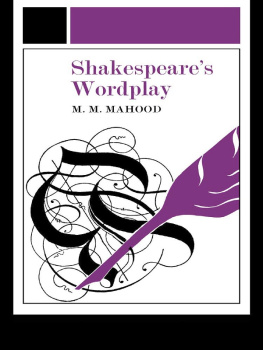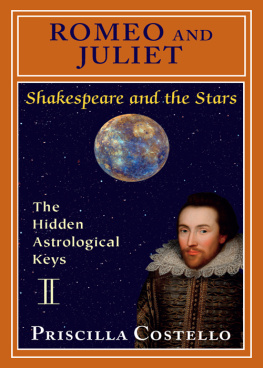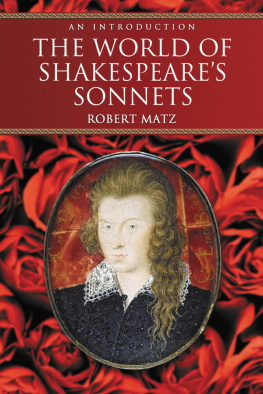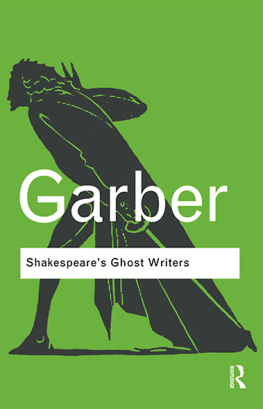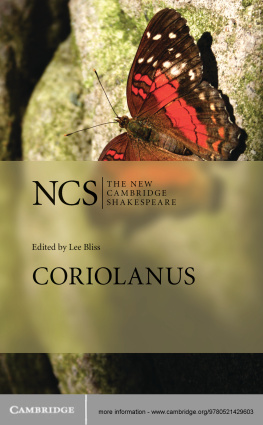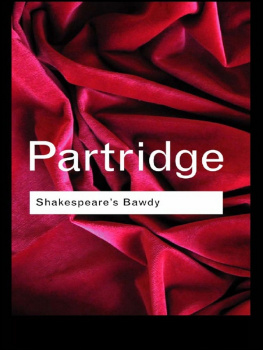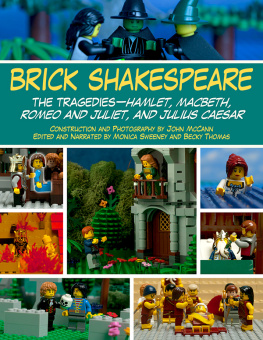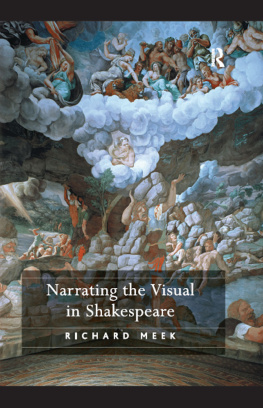I
THE FATAL CLEOPATRA
Wordplay was a game the Elizabethans played seriously. Shakespeares first audience would have found a noble climax in the conclusion of Mark Antonys lament over Caesar:
O World! thou wast the Forrest to this Hart,
And this indeed, O World, the Hart of thee,
just as they would have relished the earnest pun of Hamlets reproach to Gertrude:
Could you on this faire Mountaine leaue to feed,
And batten on this Moore?
To Elizabethan ways of thinking, there was plenty of authority for these eloquent devices. It was to be found in Scripture (Tu esPetrus) and in the whole line of rhetoricians, from Aristotle and Quintilian, through the neo-classical textbooks that Shakespeare read perforce at school, to the English writers such as Puttenham whom he read later for his own advantage as a poet. Dr Johnsons protest that a quibble was to Shakespeare the fatal Cleopatra for which he lost the world and was content to lose it itself contains a pregnant quibble. Cleopatra was fatal in being both the death and destiny of Antony; and however Shakespeares puns may have endangered his reputation with the Augustans, he was destined by his age and education to play with words.
Puns were repugnant to Johnson because a linguistic revolution as far-reaching in its effects as the Great Rebellion separated his verbal habits from Shakespeares. Half a century after Shakespeares death, Eachard put forward as a possible reform in education: Whether or no Punning, Quibling, and that which they call Joquing, and such other delicaces of Wit, highly admired in some Academick Exercises, might not be very conveniently omitted? The great aim of Eachard and his contemporaries was to make language perspicuous. It had accordingly to be freed of such prismatic devices as synonyms, metaphors and puns, Eachard sought to drive puns from the pulpit, Cowleys Ode on Wit celebrated their expulsion from poetry and the Spectator tried to blackball their admission to Augustan Societyto judge from the conversation of Swift and his friends, with small success.
Johnsons great contempt for that species of wit is the aftermath of this Augustan cult of correctness and le mot juste. Yet Johnsons experience as a lexicographer quickened his response to the alternative meanings of words. The alertness which makes him spot (to give one example) the wordplay on planta pedis in some o their Plants are ill rooted already (Antonyand Cleopatra, II.vii.12) will not allow more serious punning to pass unnoticed. Perhaps here is a poor jest intended between mood the mind and moods of musick in Cleopatras
Giue me some Musicke: Musicke, moody foode of vs that trade in Loue, (II.v.12)
and while he is loath to think that Shakespeare meant to play with the double of match for nuptial, and the match of a gun he does nevertheless respond to the Citizens pun in King John:
for at this match, With swifter spleene then powder can enforce The mouth of passage shall we fling wide ope, And giue you entrance. (II.i.447450)
Although Johnson occasionally finds a quibble which is not allowed by modern editorsas in Richard III, III.i.128: You meane to beare me, not to beare with me, where he sees an improbable pun on bear the animalhe deserves our thanks for his quick response to Shakespeares wordplay instead of the blame he sometimes gets for failing to appreciate it. He shows far more perception in the matter than the nineteenth-century commentators. Shakespeares Victorian editors, whose conflicting interpretations swell the Variorum edition, seldom saw that all the meanings of a word might be admissible even though some must take precedence over others. The puns credit was very low in the last century, in spite of Coleridges repeated efforts to justify Shakespeares puns on psychological grounds. Byrons attempts to revive a Shakespearean form of wordplay were little to the taste of the Victorians; and their own wordplay, if it surpassed the cracker-motto ingenuity of Hood, whose Fatal Cleopatra
died, historians relate,
Through having found a misplaced asp-irate,
had to hide in the nursery. Jabberwocky could be enjoyed only at seven and a half exactly.
Since then, Addisons worst fears have been realised; we have degenerated into a race of punsters. Where the Augustans disapproved of Shakespeares wordplay and the Victorians ignored it, we now acclaim it. A generation that relishes Finnegans Wake is more in danger of reading non-existent quibbles into Shakespeares work than of missing his subtlest play of meaning. Shakespearean criticism today recognises wordplay as a major poetic device, comparable in its effectiveness with the use of recurrent or clustered images. The following chapters, although they attempt a fuller treatment of this aspect of Shakespeares language than it has so far received, are not and could not be an exhaustive and final discussion of the subject. The prosperity of a pun, like that of all poetic devices, lies in the ear of him that hears it; and however faithful to Shakespeares intentions we try to remain by excluding meanings not current in his day, our acceptance or rejection of certain meanings, and the precedence we give one meaning over another, are bound to be matters of personal and subjective choice. With this in mind I have tried first, by a discussion of the functions of Shakespeares wordplay, to quicken the readers response to this aspect of his poetic art and so perhaps to add something to his enjoyment of Shakespeare. The ensuing studies of particular plays are more tentatively offered as a single readers interpretation of the meaning of each play in the light of Shakespeares delicate, ingenious and profound play of meanings.

